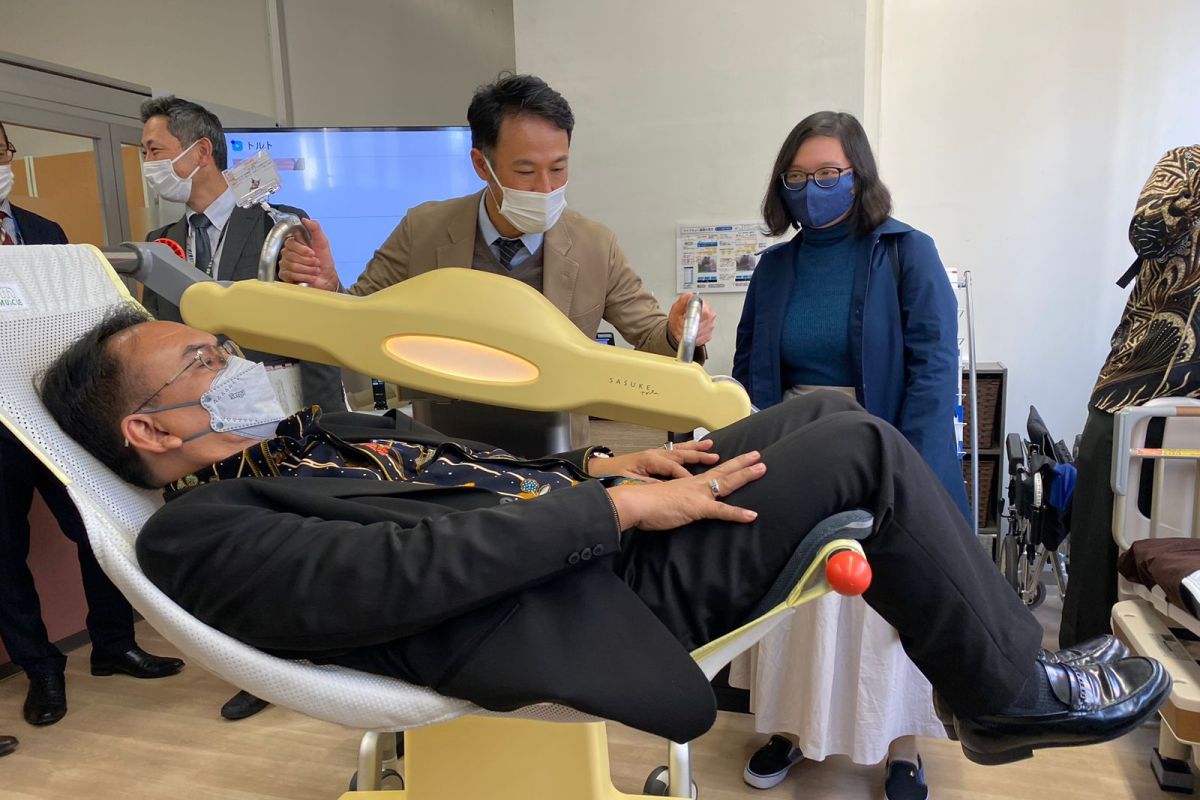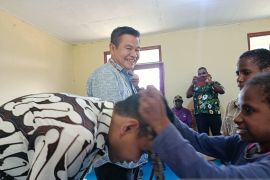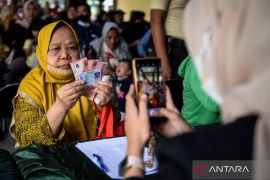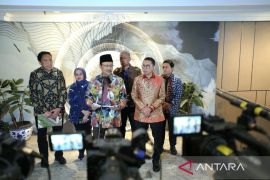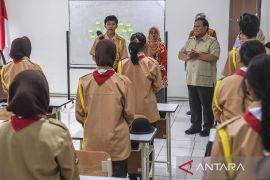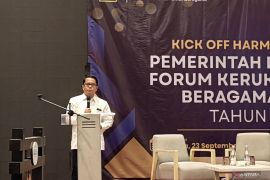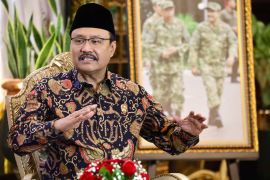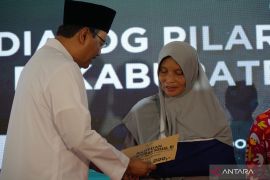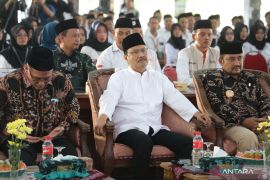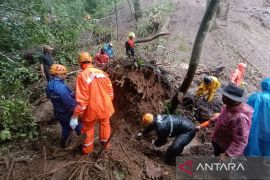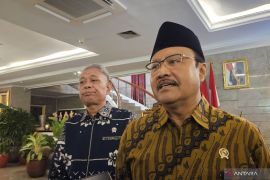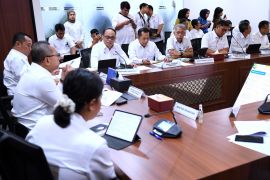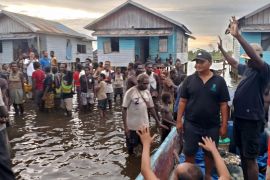Tokyo (ANTARA) – Ministry of Social Affairs’ Delegates have a chance to visit Japan for 3 days. This visit was directed from Minister of Social Affairs Tri Rismaharini in order to learn best practices about social rehabilitation services management and vulnerable group, and disaster mitigation in Land of the Rising Sun.
Ministrial Delegates divided into 2, 1st team was led by Secretary General Harry Hikmat and the 2nd team was led by Inspector General Dadang Iskandar. In Kitakyushu City, Team 1 learnt to Children Rehabilitation Center, PT. Sun Aqua Toto, Social Welfare Center Plaza, Nursing Home/ Rehabilitation Center for Elderly, Disaster Prevention Center, and various shop that sell disability products.
On the first day, Tim 1 visited Children Rehabilitation Center in Kitakyushu and PT. Sun Aqua Toto. The subsidiary of Toto’s ceramic company which has 90 disability employees from the total employee 160 (65%).
To the Vice President PT. Sun Aqua Toto Yuko Tomoguchi, Harry said that Ministry of Social Affairs has implemented ATENSI Program, which use 3 approaches, such as family, community, and residential. In 2022, this program has reached more than 250.000 beneficiaries and will continue to grow.
MoSA managed 31 centers that serves social rehabilitation and vulnerable group, and the shelter for children who have chronic disease. In day 2, the delegates visited Center of Social Welfare Equipment Plaza in Kitakyushu City, and there are various smart assistive devices for persons with disabilities.
For example: smart bed, robotic pet, laptop with eye and movement sensor, and various robotic wheelchair with artificial intelligence.
Here, the team are welcomed by the Executive Director of Planning and Coordination Bureau, Foreign Department Kitakyushu City Kubota Koji. Harry and Suhadi Lili directly tried the robotic wheelchair that can easily move from the bed and use for various activities.
Harry explained that Minister of Social Affairs made an innovation to optimize the use of technology for persons with disabilities and elderly accessibility. “There are adaptive walking stick, electric multi-purpose wheelchairs, hot water sensor, and three-wheeled motorbikes,” he said.
The work on the various assistive devices involves persons with disabilities. "This visit to the Social Welfare Center is an inspiration for us to make another breakthrough to apply AI in making various assistive devices for persons with disabilities and the elderly," said Harry.
On the third day, the Team 1 delegation witnessed up the Fukuoka Citizens' Disaster Prevention Center, which is the Mitigation Center or command center for handling before, during and after a disaster.
The presence of the Ministry of Social Affairs delegation was welcomed by the Director of the Fukuoka City Disaster Mitigation Center Yoshimitsu Hayashi and the Director of Foreign Affairs of the Fukuoka City Government Matsuda Masato. Harry stated, Indonesia has similarities with Japan, both countries with a fairly high frequency of disasters, both disasters caused by volcanic activity, tectonics and hydrometeorology.
"Japan is known as a country that is mature in managing the impact of disasters and successful in educating its citizens in dealing with disasters. The existence of this Mitigation Center is a proof of that," said Harry.
The Ministry of Social Affairs also has a Disaster Voluntary Worker (Tagana) Center in Bogor Regency. This visit can be a valuable lesson to be applied in revamping the Tagana Center.
All delegates were given the opportunity to take part in disaster simulations, ranging from fires, floods to earthquakes. Member of Team 1, Special Staff of the Minister of Social Affairs (SKM) for Human Resource Development and Ministry Programs, Suhadi Lili, was amazed and grateful for the simulation. Under the direction of the Minister of Social Affairs, a social storage was developed to bring logistical assistance closer to the disaster site.
At the end of the tour, the group was received by the Indonesian Ambassador to Japan, Heri Akhmadi, at the Indonesian Embassy (KBRI) in Tokyo. To the delegation, Ambassador Heri Akhmadi emphasized his commitment to strengthening the Ministry of Social Affairs’ programs and policies under the leadership of Social Affairs Minister Risma.
One of the commitments of the Indonesian Embassy in Japan is to purchase and market batik products produced by persons with disabilities assisted by the Ministry of Social Affairs’ Centers. "Batik products made by persons with disabilities who are assisted by the Ministry of Social Affairs’ centers are very good. We are ready to buy and sell them," said Heri.
Harry hopes that the Indonesian Embassy can provide convenience, become a bridge between the ministry and the Japanese government in following-up the process if the cooperation is formed in the future opportunities. "We hope that Indonesian Embassy will support the best practice study results as directed by the Minister of Social Affairs Risma, especially if there will be cooperation between the Ministry of Social Affairs and various parties in Japan," said Harry.
Meanwhile, Team 2 of the Ministry of Social Affairs, under the leadership of Inspector General of the Ministry of Social Affairs Dadang Iskandar visited Japan College of Social Work (JCSW), Aichi Shukutoku University and the elderly's home. On the first day, Tuesday (8/10), the team visited JCSW in Chiba City was received by the Chairman of the Chair Haniwa Natori Foundation and the Chancellor of JCSW.
Dadang conveyed several programs of Ministry of Social Affairs in helping and improving people's welfare. JCSW teacher Taishi Arimura explained, JCSW focuses on the science of child welfare. JCSW once helped Indonesian children who were survivors of the Aceh tsunami. JCSW supports the psychological recovery of child victims of abuse, violence and neglect in Japan.
The Japanese government created a supporting system in local government. Then opened a shelter as a rehabilitation and protection service, and also strengthened the care system.
The second day was still at JCSW, the Ministry of Social Affairs delegation was explained about services for persons with disabilities that are based on strong regulations. State obligations are realized by providing medical care, education, career counselling, and career promotion. The government also provides insurance for persons with disabilities.
In Dadang Iskandar's observation, education in Japan has synchronized theory and practice. “Campus facilities are very good. 96% of graduates succeed in entering the appropriate work field," he said. "JCSW has proven that the education system is very organized, including preparing human resources who focus on social services," said Special Staff of the Minister of Social Affairs for Relations and Partnerships with Foreign Agencies Faozan Amar, a member of the Team 2 delegation.
On the third day, the team visited Aichi Shukutoku University and Elderly Home, in Nagakute City, Aichi. Aichi Shukutoku University focuses on social welfare disciplines. At the elderly home, a very complete set of tools is provided. The ratio of officers and the elderly is ideal so that services can be maximized.
According to Faozan Amar, this meeting was focus on exchanging information regarding social problems in each country. "The meeting will be followed up with an MoU between the two parties," he said.
Also in the team 1 Head of the Temanggung Kartini Center Rachmad Koesnadi, Head of the Abiyoso Cimahi Center Agung Hendrawan, Head of the Jakarta Handayani Center Romal Uli Jaya Sinaga, Head of Phalamarta Center in Sukabumi Cup Santo, and the Planner from Planning Bureau Rabiah.
In the 2nd team, there are Head of Inten Soeweno Center M. Royani, Head of Pangudi Luhur Center I Ketut Supena, Head of Naibonat Center Supriyono, Head of Darussa’adah Susi Mulyati, Head of Organization and Human Resources Bureau, and Technical Team of Social Affairs Minister M. Arif. The total number of the groups are 15 persons.
Reporter: PR Wire
Editor: PR Wire
Copyright © ANTARA 2022
